 |
 |
 |
| |
Three Quarters of International HIV Group Worry About Long-Term Effects of ART - "Patient Experience and Views on Antiretroviral Treatment-Findings From the Positive Perspectives Study"
|
| |
| |
Three Quarters of International HIV Group Worry About Long-Term Effects of ART
IDWeek2017/IDSA, October 4-8, 2017, San Diego
Mark Mascolini
Almost three quarters of an international group of people taking antiretroviral therapy (ART) worry about long-term effects of antiretrovirals, according to results of a 2016-2017 survey [1]. Long-term effects also ranked as the area where ART most needs improvement, these people said, followed by availability of longer-lasting treatments.
An online HIV patient survey planned by a steering committee addressed three areas, (1) psychosocial aspects of living with HIV, (2) provider-patient dialog, and (3) patient satisfaction with current ART. This presentation focused on responses in the third area. Researchers recruited potential respondents via patient support groups, nongovernmental organizations, online communities, charities, and social media. In a telephone interview, survey staff determined whether potential participants met two eligibility criteria--diagnosed with HIV and at least 18 years old. Eligible participants got a link to an online survey and responded between November 2016 and April 2017.
The 1111 participants lived in 3 regions, Europe (55%), the United States and Canada (39%), and Australia (6%). While 75% of respondents were men, 33% were 50 or older, and 49% had been diagnosed with HIV for more than 10 years. A large majority, 91%, finished high school, 34% had a full-time job, and 48% lived in a large city. While 77% of respondents reported one or more comorbidities, 51% reported three or more. The group averaged 2 antiretroviral pills daily and took an average of 2 non-HIV medications. Half of respondents, 52%, took a single-tablet antiretroviral combination. The same proportion started treatment within 6 months of HIV diagnosis, including 88% diagnosed in the last 2 years versus 41% diagnosed 10 or more years ago.
Almost everyone, 98%, currently took antiretrovirals. Among them, 87% reported being "very satisfied" or "quite satisfied" with their treatment. Most of the remaining respondents, 10%, said they were neither satisfied nor dissatisfied. A large minority, 42%, had switched antiretrovirals in the past year. The most frequent reasons for switching were side effects (43%) and lowering pill burden (31%).
Almost three quarters of respondents, 72%, said they sometimes worry about the long-term effects of ART, and 67% raised this issue with their provider. An analysis that ranked the importance of potential improvements in ART (with a score of 100 indicating average importance) figured that the most important were (1) reducing long-term effects of antiretrovirals (score almost 200), (2) getting longer-lasting antiretrovirals (about 160), (3) fewer side effects (almost 150), and (4) getting the same effect from less HIV medicine (about 110). Almost two thirds of survey participants, 62%, said they would consider changing to a regimen with fewer antiretrovirals as long as they maintained an undetectable viral load.
The researchers cautioned that the survey sample may not represent the entire HIV population in each country or region. Because the survey could be completed only online, selection bias may have favored more technologically savvy or wealthier participants.
Reference
1. Young B, Spire B, Morcillo DG, et al. Patient experience and views on antiretroviral treatment--findings from the positive perspectives survey. IDWeek2017/IDSA. October 4-8, 2017. San Diego. Abstract 1393.
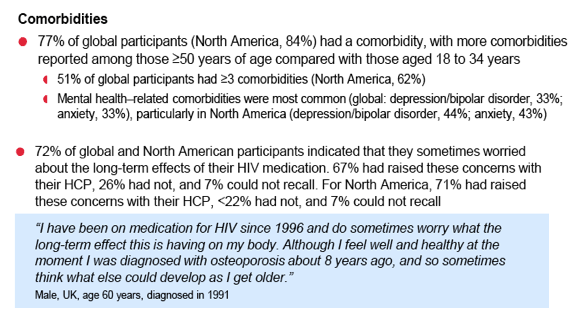
-----------------------------------
Patient Experience and Views on Antiretroviral Treatment-Findings From the Positive Perspectives Study
B Young,1B Spire,2D Garcia,3M Muchenje,4A Namiba,5K Parkinson,6S Marcotullio,7M Krehl,8B Allan,9Y Punekar,10A deRuiter,10F Barthel,11J Koteff,12C Garris,12C Nguyen,12P Eitz Ferrer,12A Ustianowski,13A Murungi10
1International Association of Providers of AIDS Care, Washington, DC; 2French National Institute of Health and Medical Research, Marseille, France; 3European AIDS Treatment Group, Spain; 4Women's Health in Women's Hands Community Health Centre, Toronto, ON, Canada; 5Salamander Trust, London, UK; 6Beacon Project, St Louis, MO; 7Nadir Onlus, Rome, Italy; 8European AIDS Treatment Group, Germany; 9Living Positive Victoria, Victoria, Australia; 10ViiV Healthcare, Brentford, UK; 11GlaxoSmithKline, London, UK; 12ViiV Healthcare, Research Triangle Park, NC; 13Pennine Acute Hospitals NHS Trust, Manchester, UK
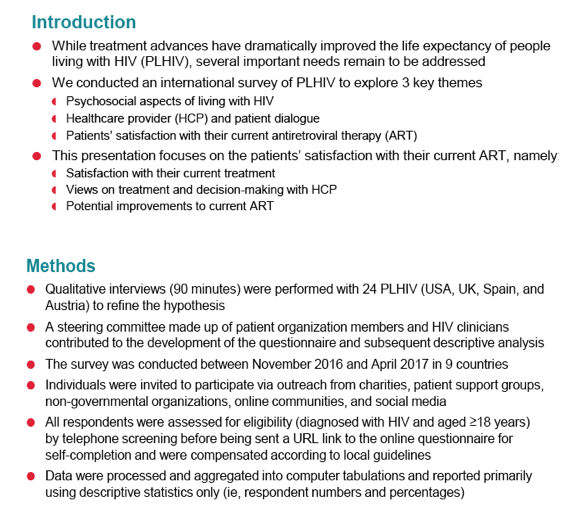
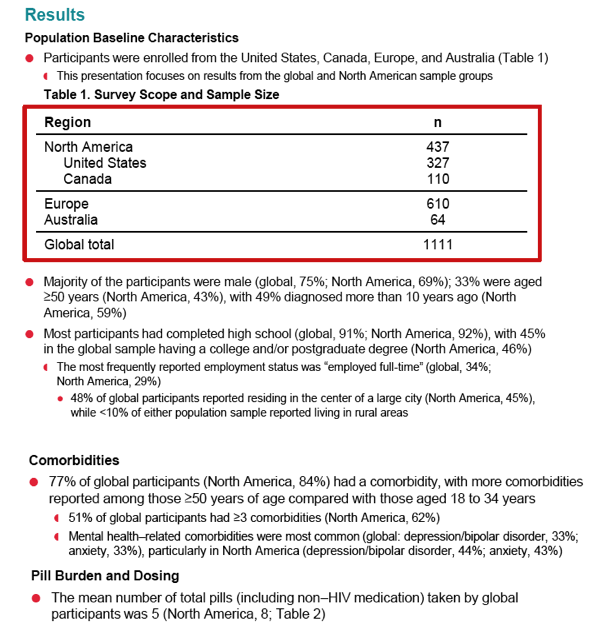
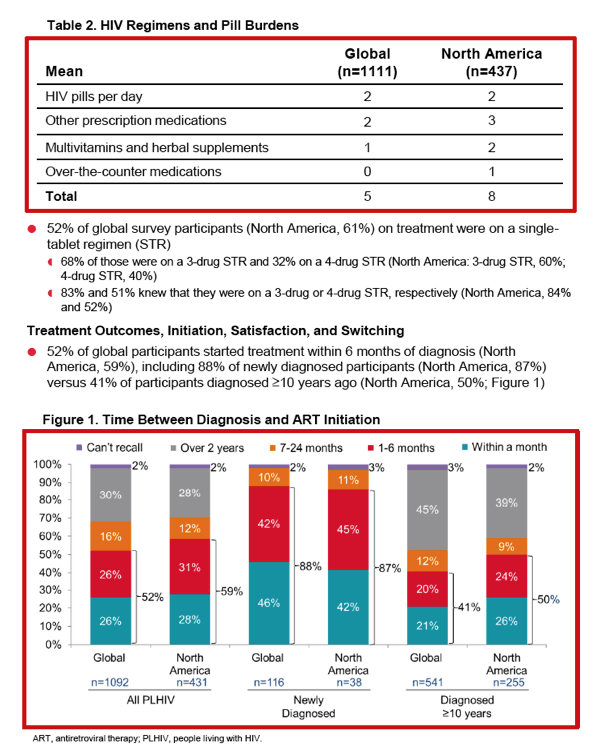
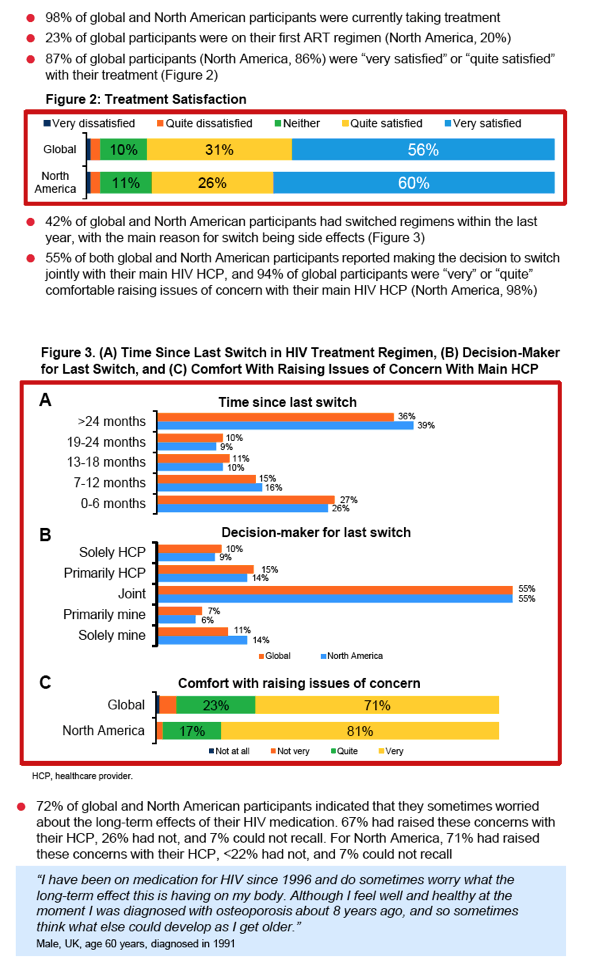
|
| |
|
 |
 |
|
|